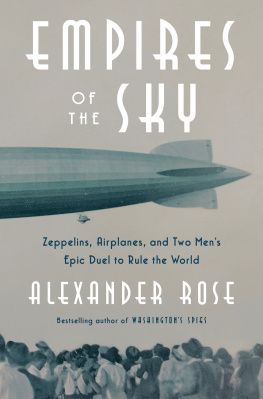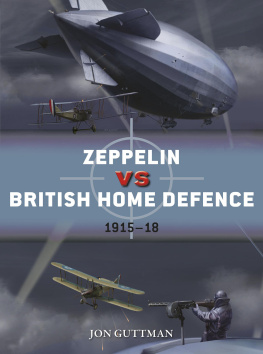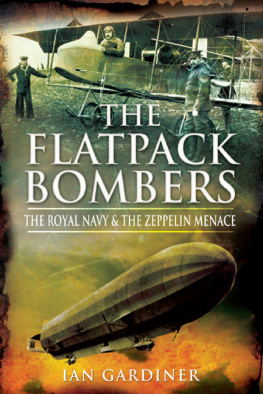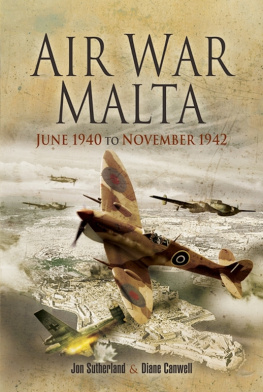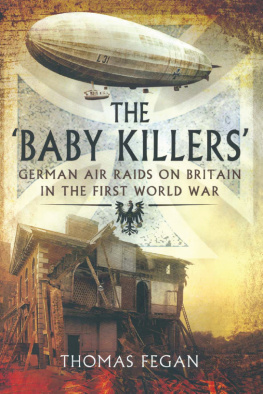The Defeat of the Zeppelins
The Defeat of the Zeppelins
Zeppelin Raids and Anti-airship Operations 1914 to 1918
Mick Powis
First published in Great Britain in 2018 by
Pen & Sword Aviation
An imprint of
Pen & Sword Books Ltd
Yorkshire Philadelphia
Copyright Mick Powis 2018
ISBN 978 1 52670 249 4
eISBN: ISBN 978 1 52670 149 7
Mobi ISBN: ISBN 978 1 52670 148 0
The right of Mick Powis to be identified as Author of this work has been asserted by him in accordance with the Copyright, Designs and Patents Act 1988.
A CIP catalogue record for this book is
available from the British Library.
All rights reserved. No part of this book may be reproduced or transmitted in any form or by any means, electronic or mechanical including photocopying, recording or by any information storage and retrieval system, without permission from the Publisher in writing.
Pen & Sword Books Limited incorporates the imprints of Atlas, Archaeology, Aviation, Discovery, Family History, Fiction, History, Maritime, Military, Military Classics, Politics, Select, Transport, True Crime, Air World, Frontline Publishing, Leo Cooper, Remember When, Seaforth Publishing, The Praetorian Press, Wharncliffe Local History, Wharncliffe Transport, Wharncliffe True Crime and White Owl.
For a complete list of Pen & Sword titles please contact
PEN & SWORD BOOKS LIMITED
47 Church Street, Barnsley, South Yorkshire, S70 2AS, England
E-mail:
Website: www.pen-and-sword.co.uk
Or
PEN AND SWORD BOOKS
1950 Lawrence Rd, Havertown, PA 19083, USA
E-mail:
Website: www.penandswordbooks.com
A List of Maps
Map 1: German airship bases in the West.
Map/Diagram 2: Zeppelin L.21
Maps 3 & 4: The first Zeppelin raid on Britain, 19/20 January 1915
Map 5: Radio locations in the North Sea
Map 6: The route of Schutte-Lanze Army Airship S.L. ( S.L.XI ) commanded by Hauptman Wilhelm Schramm. Shot down 2/3 September 1916
Map 7: Operations on the Russian Front and the Baltic
Map 8: Air-sea operations over the North Sea
Map 9: Operations over the Mediterranean
To my Nan who, when I was a little boy, told me half-remembered stories about that frightening night when she visited her Aunt Rose, and made me determined to find out more.
A Note on time
O ne of the problems with a book of this sort is that it relies on documents and official records from different sources, mainly British and German. This can lead to confusion about time. The British used GMT and, from 1916, British Summer Time (BST). The Germans used Central European Time and also, from 1916, daylight saving time (one hour ahead). It starts to get complicated because the British and Germans started and finished BST/daylight saving time on different dates. These are the dates:
British:
21 May 1916 to 1 October 1916
8 April 1917 to 17 September 1917
24 March 1918 to 30 September 1918
German:
30 April 1916 to 1 October 1916
16 April 1917 to 17 October 1917
15 April 1918 to 16 September 1918
This means that for most of the year German time is one hour ahead of British time, but for short periods they can be the same or two hours different. To simplify matters, I use British time throughout the book, GMT and British Summer Time on the relevant British dates. I also use a 24 hour clock system, and change quoted times to this.
Introduction
O n a cold and wet Sunday on 31 January 2016, a number of commemorations took place in small towns all over the country. From Sandwell to Scunthorpe, local historians, politicians and some descendants of the victims mixed with interested onlookers to remember the centenary of the most destructive Zeppelin raid of the First World War.
On 31 January 1916, nine Zeppelin airships of the Reichskreigsmarine , the Imperial German Navy, set out from their bases on the north-west coast of Germany to bomb the English Midlands; though they didnt hit it, Liverpool was their primary target. In all, seventy people were killed in the bombing and about 113 were injured. I have to admit a personal interest. My grandmother was in the market town of Wednesbury, in what is now the West Midlands, that night, waiting for a tram. For the rest of her life, she remembered sheltering in a shop doorway, with two babies, covered in dust and broken glass. She was one of the lucky ones.
Two Zeppelins bombed the Black Country between Wolverhampton and Walsall: Zeppelin L.21 , between 8.00 pm and 8.30 pm, and L.19 at about midnight. They killed thirty-five people in Tipton, Bradley, Wednesbury and Walsall.
Three Zeppelins bombed Burton-on-Trent: probably L.15 at about 8.30 pm, L.20 at about 8.45 pm and L.19 at about 9.30 pm. Fifteen people were killed.
One Zeppelin, L.20 , bombed Loughborough, killing ten people at about 8.15 pm; it then went to Ilkeston, where another two men died at about 8.30 pm.
Zeppelin L.13 bombed the Stoke-on-Trent area then went to the Scunthorpe area, killing three people at about 11.00 pm.
Finally, Zeppelin L.14 bombed Derby at about midnight, killing five people.
Throughout the centenary of the Great War there have been similar ceremonies: the first in England took place in Great Yarmouth, where two people were killed by a Zeppelin on 19 January 1915, and they will go on until 13 April 2018 when we reach the centenary of the last seven people killed by a Zeppelin in Wigan. The capital cities of London and Edinburgh have their own memorials to Zeppelin victims. Great Yarmouth also commemorates an end date, 5/6 August 1918, when Egbert Cadbury, of the famous chocolate family, took off from Yarmouth to shoot down the last Zeppelin to raid England.
Zeppelin raids were not confined to Britain. People were killed by them in Antwerp, Bucharest, Liege, Naples, Paris and Thessalonica, along with dozens of other places as far apart as the Balkans, the Baltic and Russia.
The Zeppelin raids led to considerable political pressure for an adequate blackout and air-raid precautions, and widespread anti-German atrocity propaganda. Several coroners juries rendered verdicts of murder by the German Kaiser and Crown Prince. The Zeppelin raids had a massive effect on morale in Britain and caused severe disruption to war production. The Government knew something had to be done to defeat the Zeppelins.
In the end, the fear, anger, economic and political pressure generated by the raids led to the development of a successful air-raid defence policy. I have covered in detail the events of the frosty foggy night of 31 January 1916 in my book Zeppelins over the Midlands (Pen and Sword, 2016), and in less detail what happened to the Zeppelins and their crews after this. In this book, I simply want to analyze what happened next, and put the defeat of the Zeppelins in a wider context.


